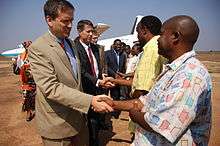Mark Andrew Green
| Mark Green | |
|---|---|
 | |
| United States Ambassador to Tanzania | |
|
In office September 12, 2007 – January 20, 2009 | |
| President | George W. Bush |
| Preceded by | Michael Retzer |
| Succeeded by | Alfonso Lenhardt |
| Member of the U.S. House of Representatives from Wisconsin's 8th district | |
|
In office January 3, 1999 – January 3, 2007 | |
| Preceded by | Jay Johnson |
| Succeeded by | Steve Kagen |
| Member of the Wisconsin State Assembly | |
|
In office 1993-1999 | |
| Personal details | |
| Born |
June 1, 1960 Boston, Massachusetts, U.S. |
| Political party | Republican |
| Spouse(s) | Sue Green (1985-present) |
| Children | 3 |
| Alma mater |
University of Wisconsin, Eau Claire University of Wisconsin, Madison |
| Religion | Roman Catholicism |
Mark Andrew Green (born June 1, 1960) is an American politician. He served in the Wisconsin State Assembly from 1993 to 1999, was a Republican member of the United States House of Representatives from 1999 to 2007, representing Wisconsin's 8th congressional district, ran unsuccessfully for Governor of Wisconsin in 2006, and held the post of United States Ambassador to Tanzania from August 2007 until January 2009. Since 2014, he has served as president of the International Republican Institute (IRI),[1] and sits on the board of directors of the Millennium Challenge Corporation.
Early life, education, and career
Green was born in Boston, Massachusetts to Jeremy and Elizabeth Green. His family moved often, and as a child he lived in Jersey City, New Jersey; Cincinnati, Ohio; England; South Africa; and Australia.[2] He attended Abbot Pennings High School (now Notre Dame Academy) in De Pere, Wisconsin.[3]
Green received a bachelor's degree from the University of Wisconsin–Eau Claire in 1983. and a Juris Doctor from the University of Wisconsin–Madison in 1987.[3] In law school, he served as a managing editor of the Wisconsin Law Review and won the Justice Robert Jackson Award from the Washington, D.C. Foreign Law Society for "Best Published Student Writing on a Foreign Law Subject". Following graduation from law school, he joined the law firm Godfrey & Kahn S.C. at their Green Bay offices.
Political career
Wisconsin State Assembly
In 1992, Green was elected to the Wisconsin State Assembly, where he served for six years and rose to the position of chairman of the Republican Caucus.[4][5] He chaired the Judiciary Committee, served on the Board of the Wisconsin Housing and Economic Development Authority (WHEDA), and helped reform state housing policy. Green's legislative work won him awards from the Wisconsin and American Farm Bureau Federations, the United States Chamber of Commerce, the National Federation of Independent Business, the National Rifle Association, the Wisconsin Builders Association, the Wisconsin Medical Society, Citizens Against Government Waste, Watchdogs of the Treasury, and the Seniors Coalition.
U.S. House of Representatives
Green first ran for Congress in 1998, defeating first-term Representative Jay Johnson, with 54% of the vote. Green won each of his next three elections with 70% or more of the vote.[3] He represented Wisconsin's 8th Congressional District from the 106th Congress until the 109th Congress.
Green was a member of the House International Relations Committee in the 107 - 109th sessions of Congress. He helped draft the Millennium Challenge Act, the Global Access to HIV/AIDS Prevention, Awareness and Treatment Act of 2001, and the U.S. Leadership Against HIV/AIDS, Tuberculosis and Malaria Act. He also supported the wars in Afghanistan and Iraq, and co-founded the Victory in Iraq Caucus.[6]
Green attempted to raise awareness about human rights violations by the communist, Pathet Lao government in Laos against the ethnic minority, Hmong people and others suffering under authoritarian governments and about religious freedom issues in Laos and Southeast Asia.[7][8][9][10] [11][12] Many Hmong Americans had resettled in Wisconsin as political refugees following the Vietnam War.
In January 1999, Green was appointed an Assistant Majority Whip by then-House Majority Whip Tom DeLay, and then re-appointed by House Majority Whip Roy Blunt.[13]
In Green’s tenure in the U.S. House of Representatives, he was a member of the House Judiciary Committee, vice chair of the Crime, Terrorism and Homeland Security Subcommittee, and co-founded the bipartisan Faith-Based Caucus. He co-led the floor debate on the "Faith-Based Initiative", a plan to re-enlist faith-based communities in the national fight against poverty and social crises. As part of that effort, he co-founded the bipartisan Faith-Based Caucus. Green helped expand the Violence Against Women Act, and wrote the "Two Strikes and You're Out Child Proctection Act," which cracks down on repeat child molesters. He also wrote the "Debbie Smith Act," which was meant to assist law enforcement in modernizing its DNA database, and the "Adam Walsh Act". He supported the death penalty and the No Child Left Behind act.
2006 Wisconsin gubernatorial campaign
Green unsuccessfully ran for Governor of Wisconsin against incumbent Governor Jim Doyle, a Democrat. Green had no opponent in the Republican Party (GOP) primary. Then-Milwaukee County Executive Scott Walker dropped out of the GOP primary on March 24, 2006, citing a lack of campaign funds (he would later win the governorship in 2010).[14] After the primary, Green was joined on the ticket by State Rep. Jean Hundertmark of Clintonville, who had defeated Nick Voegeli in primary for lieutenant governor.[15]
U.S. Ambassador to Tanzania

On June 8, 2007 President George W. Bush announced Mark Green's nomination as Ambassador to Tanzania. Senator Russ Feingold, chairman of the African Affairs Subcommittee of the Senate Foreign Relations Committee, held hearings on Green's nomination as ambassador on June 19.
Senator Chris Dodd, a member of the Senate Foreign Relations Committee, put a hold on Green's nomination to replace Michael Retzer as ambassador, citing Retzer's action of revoking the country clearance of Peace Corps Country Director Christine Djondo as interference in the independence of the Peace Corps. On June 28, when the State Department provided a letter of apology to Djondo, Dodd released his hold on Green's nomination. That same day Senator John Kerry put a block on Green's nomination because Green was not a career diplomat. However, Green had the public support of the Wisconsin Congressional delegation, both Democrats and Republicans, and a number of other key Democratic leaders. On August 3, 2007 the Senate confirmed Green as ambassador to Tanzania by unanimous consent.[16] He resigned as ambassador to Tanzania upon Barack Obama's inauguration as president.
Tenure

During Green’s tenure, President George W. Bush visited Tanzania in February 2008, the first official visit by a sitting U.S. president; Tanzania hosted Sullivan Summit VIII, the first Sullivan Summit in East Africa; President Kikwete visited the White House in August 2008; and the largest Millennium Challenge Corporation (MCC) Compact in history was signed.
During his tenure, Green helped craft the Millennium Challenge Act, which expanded America’s commitment to invest in developing nations that are pursuing political and economic reforms. He worked to enact the Global Access to HIV/AIDS Prevention, Awareness and Treatment Act of 2001 and the U.S. Leadership Against HIV/AIDS, Tuberculosis and Malaria Act. He worked on legislation covering policy areas like international terrorism and human trafficking. In 2005, Green worked with the National Democratic Institute for International Affairs, the International Republican Institute and the State Department as an election observer in Kenya. He also traveled to West Africa with the Academy for Educational Development, Oxfam and Save the Children to work on programs related to women’s health and education.
Foundation work
Green was a director of the policy center of Malaria No More, a global effort to eliminate malaria.
He has served as a senior director of the U.S. Global Leadership Coalition (USGLC) since 2011. USGLC is a foreign policy foundation that describes itself as " A broad-based influential network of 400 businesses and NGOs; national security and foreign policy experts; and business, faith-based, academic and community leaders in all 50 states who support a smart power approach of elevating diplomacy and development alongside defense in order to build a better, safer world."
In February, 2013, Green was appointed President & CEO of Initiative for Global Development, a nonprofit organization aimed at reducing world poverty.[17]
Electoral history
| Party | Candidate | Votes | % | ± | |
|---|---|---|---|---|---|
| Democratic | Jim Doyle (Incumbent) | 1,139,115 | 52.8 | +7.7 | |
| Republican | Mark Green | 979,427 | 45.3 | ||
Personal life
Mark and Susan (née Keske) Green wed on August 5, 1985, and have three children. Green and his wife served as volunteer teachers in Kenya with WorldTeach in 1987 and 1988, and while in Africa, visited rural areas of neighboring countries.
Citations
- ↑ "Ambassador Mark Green". International Republican Insitute. Retrieved February 15, 2016.
- ↑ End Game, Milwaukee Magazine, October 2005
- 1 2 3 Milwaukee Journal Sentinel JSOnline candidate page
- ↑ Mark Green profile at legistorm.com
- ↑ Mark Green profile at bioguide.congress.gov
- ↑ "Wilson, Green Announce Victory in Iraq Caucus". June 30, 2005. Retrieved February 15, 2016.
- ↑ Marc Kaufman, "Missing Tourists as Reprisal Victims? Laotian Refugees in U.S. Suspect Disappearance of Hmong Men Was No Accident" Washington Post, 29 November 1999.
- ↑ The Center for Public Policy Analysis (CPPA)
- ↑ Lao Veterans of America
- ↑ Frederic J. Frommer, "U.S. ambassador pushes ahead with trade deal for Laos", Associated Press, September 5, 2003.
- ↑ James Morrison, "Loss in Laos", Washington Times, 12 November 2003.
- ↑ Frommer, Frederic J., "Concern for Hmong in Laos Kohl, Feingold Seek U.N. Probe", The Capital Times, Madison, Wisconsin, 23 March 2004.
- ↑ Mark Andrew Green political profile
- ↑ Walker bows out of race, by Dave Umhoefer, Milwaukee Journal Sentinel, 3/24/06
- ↑ September 2006 Primary Election, by Andy Franken, The Hamilton Consulting Group, September 21, 2006
- ↑ Green Bay Press Gazette. "Senate confirms Green nomination" by Ellen Ferguson. August 4, 2007.
- ↑ Initiative for Global Development. "Ambassador Mark Green Named President & CEO of Initiative for Global Development", January 23, 2013. Accessed December 19, 2013.
External links
| Wikimedia Commons has media related to Mark Andrew Green. |
- Biography at the Biographical Directory of the United States Congress
- Financial information (federal office) at the Federal Election Commission
- Dodd puts hold on Mark Green's nomination for US ambassador to Tanzania
- Mark Green, Wisconsin Historical Society
| United States House of Representatives | ||
|---|---|---|
| Preceded by Jay Johnson |
Member of the U.S. House of Representatives from Wisconsin's 8th congressional district 1999–2007 |
Succeeded by Steve Kagen |
| Party political offices | ||
| Preceded by Scott McCallum |
Republican nominee for Governor of Wisconsin 2006 |
Succeeded by Scott Walker |
| Diplomatic posts | ||
| Preceded by Michael Retzer |
United States Ambassador to Tanzania 2007–2009 |
Succeeded by Alfonso Lenhardt |
| Wisconsin's delegation(s) to the 106th–109th United States Congresses (ordered by seniority) | ||
|---|---|---|
| 106th | Senate: H. Kohl • R. Feingold | House: D. Obey • J. Sensenbrenner • T. Petri • J. Kleczka • R. Kind • T. Baldwin • M. Green • P. Ryan |
| 107th | Senate: H. Kohl • R. Feingold | House: D. Obey • J. Sensenbrenner • T. Petri • J. Kleczka • R. Kind • T. Baldwin • M. Green • P. Ryan |
| 108th | Senate: H. Kohl • R. Feingold | House: D. Obey • J. Sensenbrenner • T. Petri • J. Kleczka • R. Kind • T. Baldwin • M. Green • P. Ryan |
| 109th | Senate: H. Kohl • R. Feingold | House: D. Obey • J. Sensenbrenner • T. Petri • R. Kind • T. Baldwin • M. Green • P. Ryan • G. Moore |